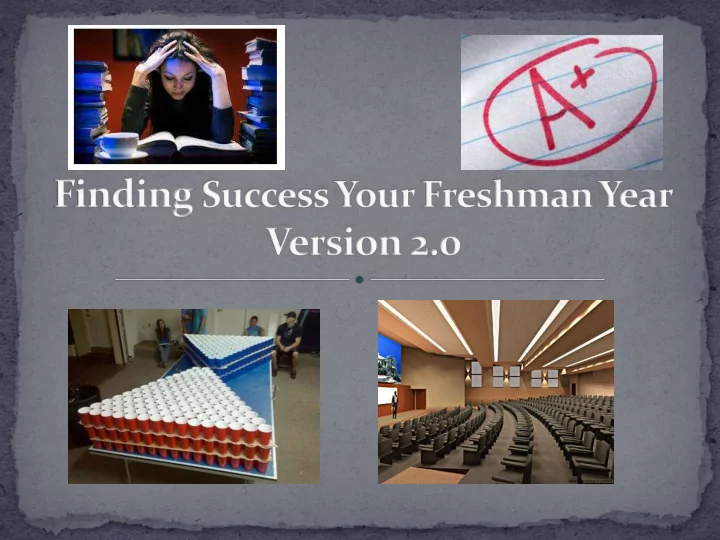

Being responsible for oneself No one is going to tell you when to go to class, study, sleep, (or when to stay in) The workload will increase. Yeah. Transition from being the big dogs in town to the bottom of the barrel
• Copy Evolution notes Club meeting • Scholarship Application Make Evolution Study Guide • Seminar group meeting Copy Chemistry Notes • Read Extra Credit book for Repro. Chemistry OWLs (online homework) • Go to Evolution Review Session Chemistry Problem Set • Riding Lesson (once/ week) Chemistry ASA pre-lab • Work (6 hours/week) Make 3 lectures of chemistry note cards Complete practice Chemistry Tests Make Reproductive Physiology Study Guide Make Reproductive Physiology Note Cards Write Repro. Paper Take Mythology Notes + Attend Class and Ace 3 Write Mythology Paper Exams! (one of which was Read the Odyssey outside of regular class time)
Food Sleep You need to get enough sleep for you memory to work properly! Exercise Balance This the most important!
Meeting new people Keeping in mind everyone is in the same boat Work before fun, the fun will be much more enjoyable if work isn’t hanging over your head Being courteous
Set ground rules from the get go Deal with problems when they are little KEEP AN OPEN MIND The golden rule Communicate before the semester begins to arrange who is bringing what ALWAYS BE CONSIDERATE
Clubs Sports Community Service Involvement fairs Internship Opportunities Job Getting to know people in your major Greek Life Orientation*
How they will change: Takes upwards of 6 times of exposure for a piece of information to be ingrained in your long term memory Rule of thumb: spend 3 hours on their material for every 1 hour spent in class READ BEFORE CLASS! Rewrite notes Make sure you know anything a professor says more than once Copy down everything they write onto a prepared lecture*
Charts! Charts! Charts! Flashcards Take Breaks Studying for six-half hour sessions is much more effective than 3 straight hours Changing locations helps with writer’s block
http://www.sp.uconn.edu/~ph101vc/study/Improve.ht ml http://www.studygs.net/index.htm “Study Smart, Study Less” by Anne Crossman ISBN: 9781607740001 http://www.howtostudy.org/ http://www.muskingum.edu/~cal/
This was the hardest part for me Find out which environment works best for you Get up at 7 everyday, even if you don ’ t have class (No, I am not crazy) Make a schedule and stick to it Don’t panic if your first semester grades aren’t what you are used to How you study may vary from class to class Change your habits if they are not working
Tutoring centers Find a tutor you connect with and go to their hours Office hours Establish a good relationship with your advisor Older Students Old professors* Study Groups Good and Bad
This will happen.
Study guides given by professors are a gift from a higher power, use them! A large portion of your final grade often rests on these tests, so start preparing for them early I make study guides for every midterm (usually 2-3 midterms), so at the end you have your study material made Stay close to the entire time allotted, if it is a cumulative test it should be designed to take the entire time
DON ’ T BE AFRAID TO ASK FOR HELP OR ADVOCATE FOR YOURSELF If you don’t have a resume made, make one and have it on file Make a formal email address; list your .edu address on the resume Always know who you are addressing Be tenacious in pursuing questions Last fall semester, I was fighting with my professor over my final grade for the entire winter break, if you think a mistake was made, speak up!
Job on campus Apply for work study (FAFSFA) Apply for internships Renting/textbook buyback Chegg Amazon Cars on campus*
Planner* Index cards Highlighters External hard drive Ear plugs Rain/snow gear Printer (look for special promotions if you are buying a laptop) DO NOT BRING SUBWOOFERS!
Treat college like a full-time job – 40 hours a week Stay on campus, especially in the first few months Plagiarism is a much bigger deal in college than it was in high school. Be aware! CITE EVERYTHING! Use GOOGLE tools! Take a walk and find your classrooms before the first day of classes. PLEASE! Go to Seminars http://forums.studentdoctor.net/ http://www.ratemyprofessors.com/
Recommend
More recommend